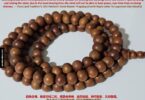Question: Is it so that if the consciousness has yet to leave the body upon death, but if left untouched, will not feel pain and suffering?
Answer: Since death is disconnection of the consciousness from the body, if it remains in the undisturbed body after physical death due to habitual mental attachment, there will be no physical pain from the body itself, as bodily pains due to sickness are disconnected from.
(Note: Although it is possible for the very mindful to have physical pain without mental suffering over it, the unmindful tend to have pain with suffering due to it, or even have suffering over fear, worry, attachment and confusion, about imagined or anticipated pain and misery.)
However, for those not ready to depart in time, this pain-free state is only for a short while… till the body is eventually touched and moved, for cleaning, changing, encoffining, burying, cremating… This is when pain magnified by nine times in sensitivity is experienced through the body clung to. If away from the body, thus not clung to, there will be no pain.
Note that mental suffering from ‘attachment to the transpired life’, ‘aversion of death (and rebirth)’, and ‘delusion of what is happening and about to happen’ are still able to exist, even when not touched. Thus, even without any physical pain (身痛), there can be great mental suffering (心苦).
Without timely guidance (开示) and support-chanting (助念) offered, to connect to Āmítuófó (阿弥陀佛) for blissful departure, while with strong attachment, even to an undisturbed body, the winds of karma will still eventually force the consciousness to be reborn, often unhappily in these cases.
Due to attachment, aversion and delusion mentioned above, they can still lead to great anguish, described to be like that of a living tortoise being torn from its ’own’ shell (生龟脱壳). This is how clinging to the body despite death can create both pain and suffering, by feeling with intensified sensitivity through the body, though there is no need to.
Question: If dissolution of the four great elements (四大分解) is completed upon death, will the consciousness still feel pain when touched?
Answer: Beyond the individual’s karmic conditions subject to, the greatest suffering for most who die without guidance and support-chanting is due to being unprepared for the dissolution of the elements, with the discomfort directly conditioning their suffering.
It is not easy to tell exactly when this process is complete. Even if complete, the problems detailed in the previous answer can still exist, thus still with potential for pain and suffering if touched. This is why the body should remain untouched for as long as possible, while continually offering guidance and support-chanting, to facilitate swift departure to Pure Land.
Pure Land practitioners should NOT worry about the ‘horrifying’ dissolving process of the four elements at all. This is so as the mind can only hold one thought in each thought moment. Thus, there should only be wholehearted mindfulness of Āmítuófó’s name, to connect to him as swiftly as possible, to be guided by him to reach his Pure Land.
If mindful of fear and worry instead, the mind will be preoccupied, making it harder to be mindful of Āmítuófó; while being fully occupied with faithful mindfulness of his name will not allow such preoccupation in the first place. Once there is connection to Āmítuófó, there will be peace and bliss instead of pain and suffering, without need to enter the bardo (intermediate) state.
The more fear and worry one has of dying later, the more should one practise mindfulness of Āmítuófó sincerely now. With more practice now, there will be less fear and worry later, if any at all. This is why we should practise well in everyday life, so as to swiftly connect to Āmítuófó firmly when it is time to do so.
(Note: Experience of the dissolution of the four great elements for one who does not know how to practise mindfulness of Āmítuófó can be like a terrible final physical sickness, that seems very strange and disturbing.
Below is a very brief summary of its four-stage process. Again, Pure Land practitioners should NOT fret about it, as it will NOT apply if mindfulness of Āmítuófó is practised sincerely.
[1] When the body feels heavy (as if sinking into earth) and weaker, dissolution of the earth element has begun. [2] When the body feels dry, with saliva, sweat, urine, blood and other fluids out of control, dissolution of the water element has begun. [3] When the body loses warmth, unable to digest food and drink, inhaling weakly while exhaling strongly, dissolution of the fire element has begun. [4] When the body has difficulty breathing, dissolution of the wind element has begun.
Before, during and after the appearance of these stages, there should be seamless guidance and support-chanting offered, so as to prevent needless suffering, or to swiftly end it if it has arisen.)
Question: Without (physical) Ear Consciousness (耳识) after death, how does the Eighth Consciousness (第八意识: 阿赖耶识; Ālaya-Vijñāna) (which stores all our experiences and karmic seeds, and is what takes rebirth) hear guidance and support-chanting?
Answer: Upon physical death, the five physical senses’ consciousnesses (of sight, sound, smell, taste and touch: 色声香味触), and the Sixth Consciousness (第六意识: 意识; Mano-Vijñāna) (of thought: 法), that function together through the body will expire or collapse into the Seventh Consciousness (第七意识: 末那识; Mānas-Vijñāna), that will combine with the Eighth Consciousness (for those yet to be liberated from attachment to self). (Using an analogy, imagine a collapsible folding cup with eight layers, with the first six layers collapsing into the seventh, before finally into the eighth.)
(Note: The Sixth Consciousness has cognition of that sensed, while the Seventh Consciousness has thought (or mental processing) about that cognised. The Seventh Consciousness habitually localises experiences with thinking, while universalising experiences with intuitively but subjective perception based on the Eighth Consciousness. Functioning as a to and fro buffer (or bridge) between the first six consciousnesses and the eighth, this creates the illusion of ‘self’ that is attached to.)
After death, the Eighth Consciousness retains the ability to sense without use of physical sensory organs. Since no longer limited by functioning through old, diseased and expired organs, this ability is magnified by nine times in sensitivity. Thus, the Eighth Consciousness is not blind or deaf; able to perceive very clearly, even able to read minds directly. This is why guidance and support-chanting offered then is just as, if not more important, for guiding to Pure Land. It is also why there should be even less distractions, as they will be magnified in experience.
In the dying process, hearing is the last physical sense to diminish. However, in the bardo state, one can see and hear others more clearly than when alive, (while non-Buddhas and others not in the bardo state are unable to see or hear one). In the Tibetan Buddhist tradition, there is at times the practice of reciting the Bardo Thödol (Liberation in the Intermediate State Through Hearing; Tibetan Book of the Dead) over post-death days, to guide the consciousness of the recently deceased with changing instructions towards a favourable rebirth. (However, one might not be in the bardo state long enough, to hear, understand and apply that heard properly.) In the Chinese Pure Land tradition, direct and streamlined offering of guidance with support-chanting will suffice.





